2022年人教版中考英语二轮复习话题五 天气、自然、世界与环境课件(80张)
文档属性
| 名称 | 2022年人教版中考英语二轮复习话题五 天气、自然、世界与环境课件(80张) | 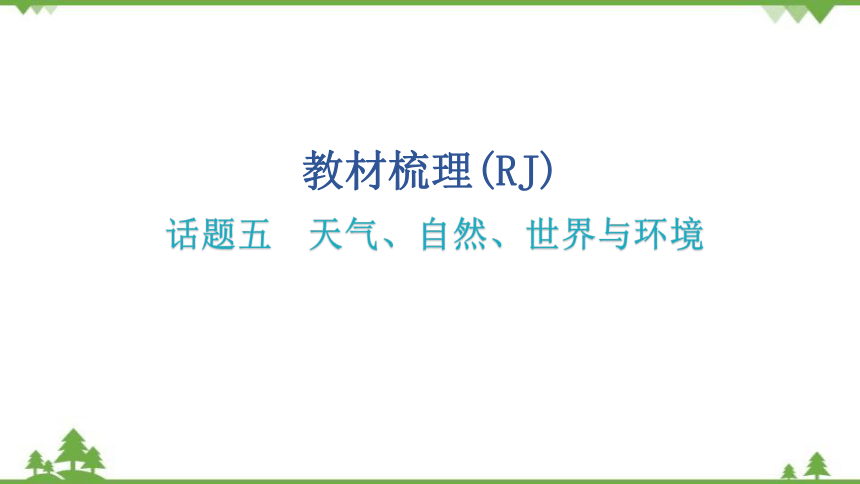 | |
| 格式 | pptx | ||
| 文件大小 | 370.8KB | ||
| 资源类型 | 教案 | ||
| 版本资源 | 人教新目标(Go for it)版 | ||
| 科目 | 英语 | ||
| 更新时间 | 2022-05-24 12:06:27 | ||
图片预览

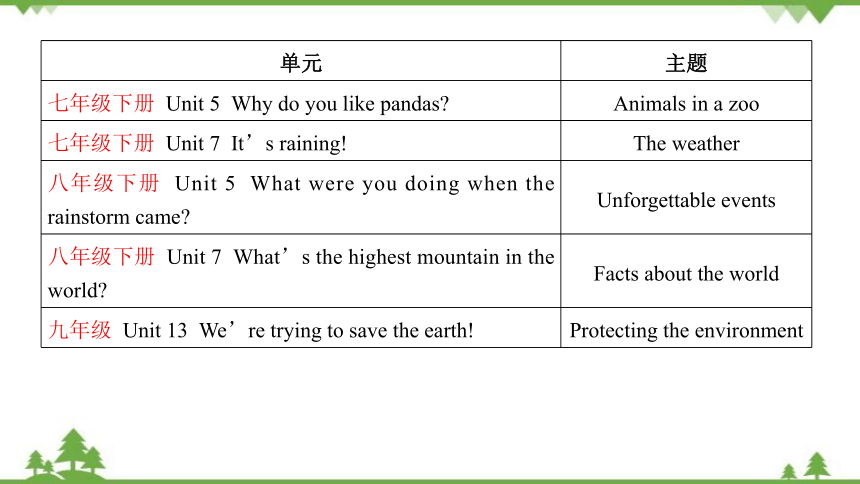
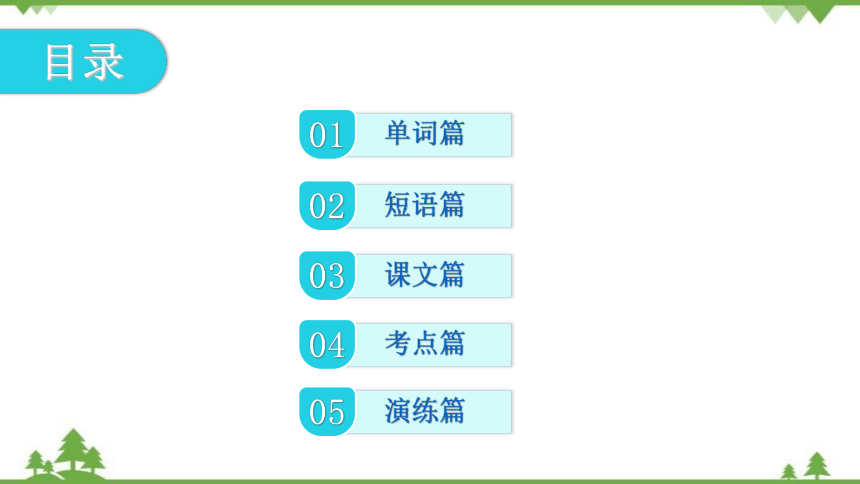
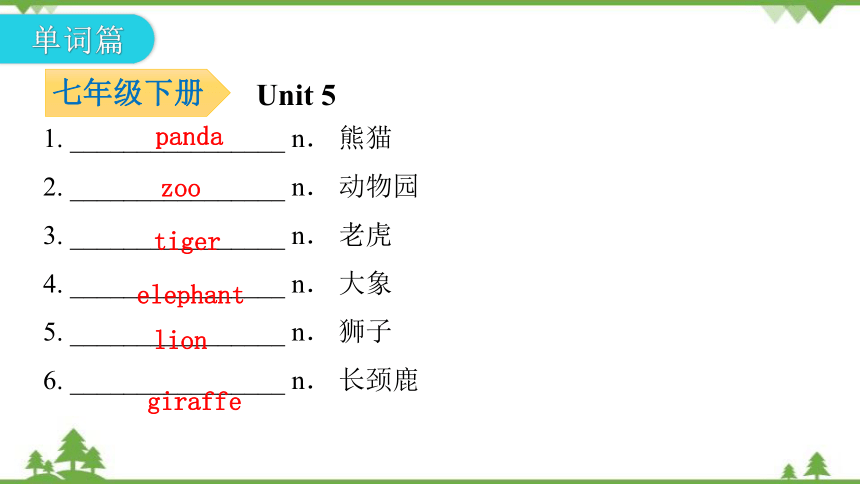
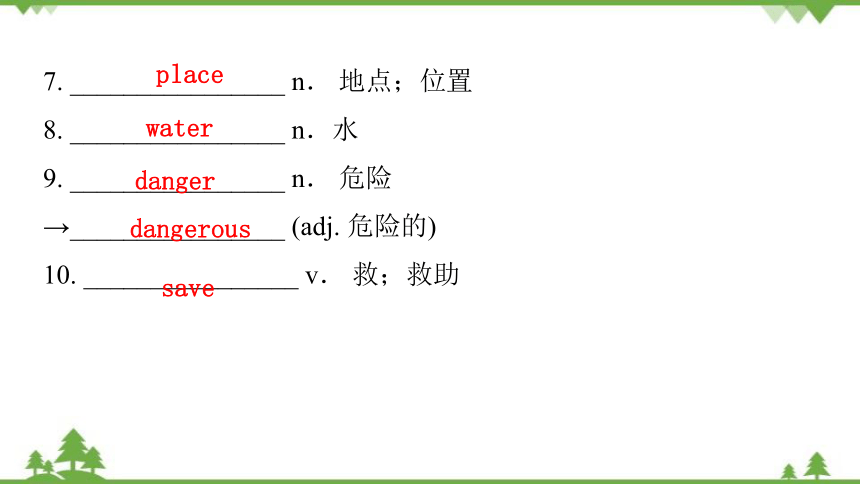

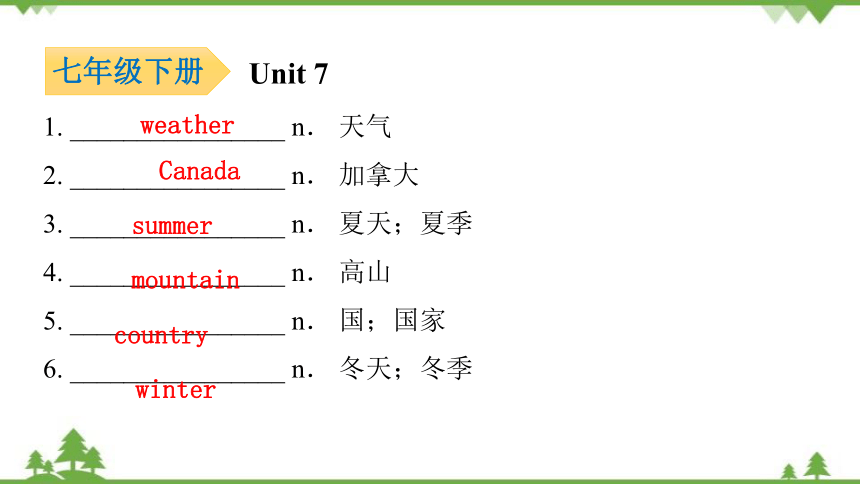
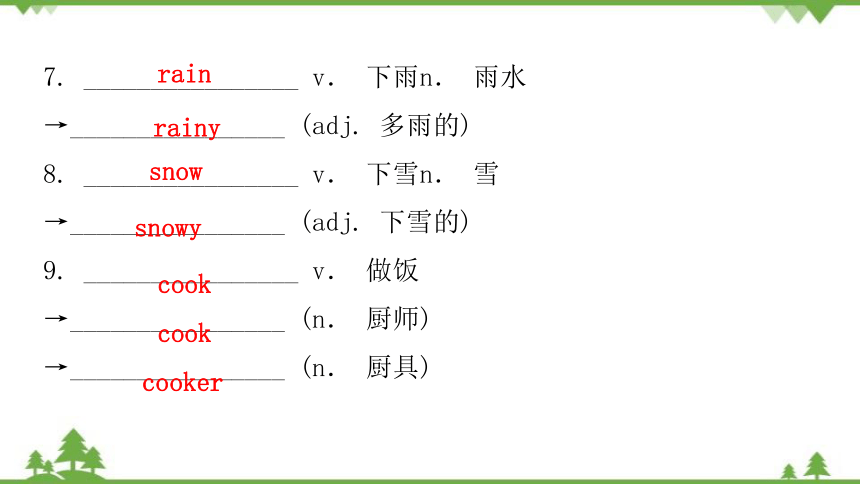
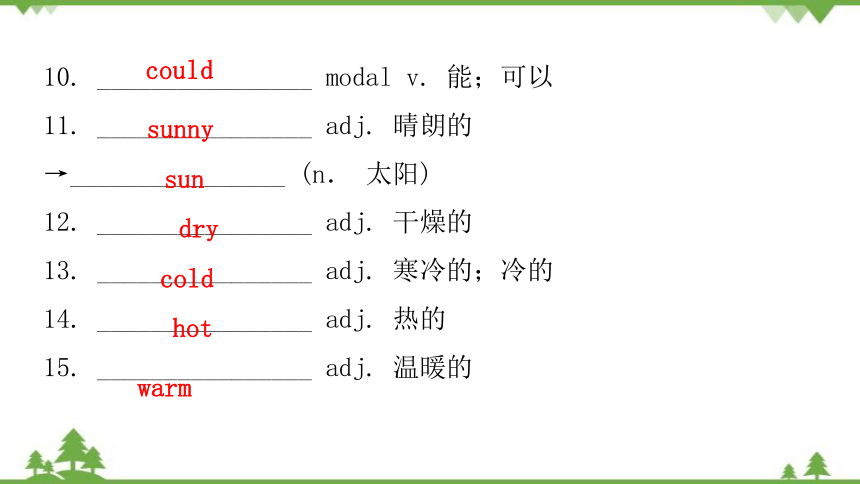
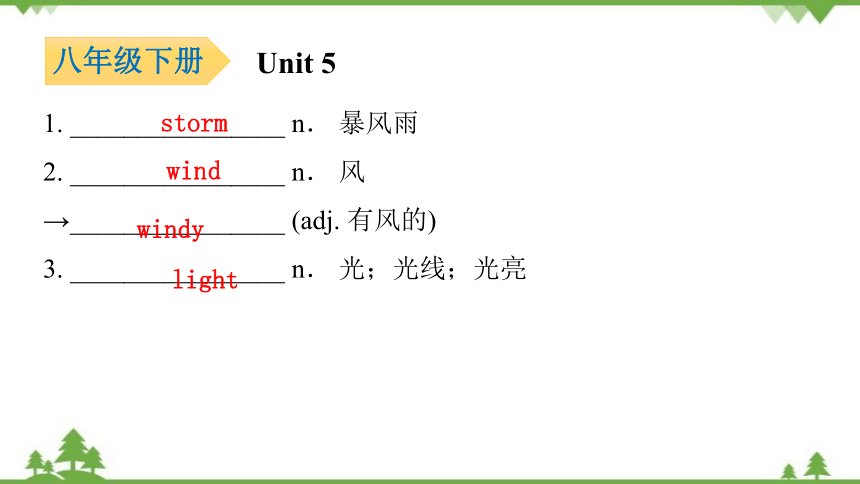
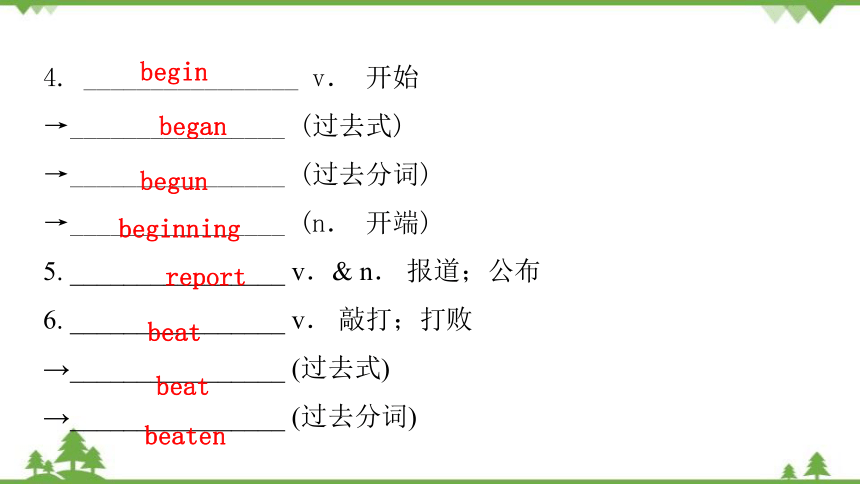
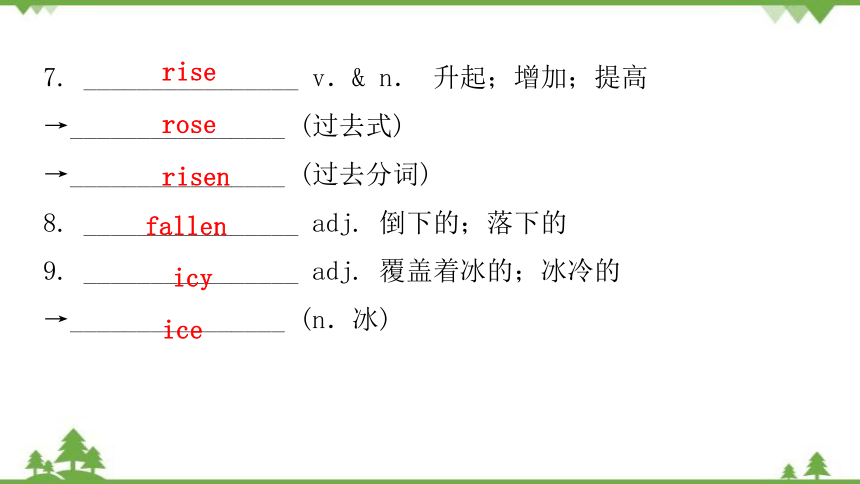
文档简介
(共80张PPT)
教材梳理(RJ)
话题五 天气、自然、世界与环境
单元 主题
七年级下册 Unit 5 Why do you like pandas Animals in a zoo
七年级下册 Unit 7 It’s raining! The weather
八年级下册 Unit 5 What were you doing when the rainstorm came Unforgettable events
八年级下册 Unit 7 What’s the highest mountain in the world Facts about the world
九年级 Unit 13 We’re trying to save the earth! Protecting the environment
目录
01
单词篇
02
短语篇
03
课文篇
04
考点篇
05
演练篇
单词篇
七年级下册
Unit 5
1. ________________ n. 熊猫
2. ________________ n. 动物园
3. ________________ n. 老虎
4. ________________ n. 大象
5. ________________ n. 狮子
6. ________________ n. 长颈鹿
panda
zoo
tiger
elephant
lion
giraffe
7. ________________ n. 地点;位置
8. ________________ n.水
9. ________________ n. 危险
→________________ (adj. 危险的)
10. ________________ v. 救;救助
place
water
danger
dangerous
save
11. ________________ v. 忘记;遗忘
→________________ (过去式)
→________________ (过去分词)
12. ________________ v.砍;切
→________________ (过去式 / 过去分词)
forget
forgot
forgotten
cut
cut
1. ________________ n. 天气
2. ________________ n. 加拿大
3. ________________ n. 夏天;夏季
4. ________________ n. 高山
5. ________________ n. 国;国家
6. ________________ n. 冬天;冬季
七年级下册
Unit 7
weather
Canada
summer
mountain
country
winter
7. ________________ v. 下雨n. 雨水
→________________ (adj. 多雨的)
8. ________________ v. 下雪n. 雪
→________________ (adj. 下雪的)
9. ________________ v. 做饭
→________________ (n. 厨师)
→________________ (n. 厨具)
rain
rainy
snow
snowy
cook
cook
cooker
10. ________________ modal v. 能;可以
11. ________________ adj. 晴朗的
→________________ (n. 太阳)
12. ________________ adj. 干燥的
13. ________________ adj. 寒冷的;冷的
14. ________________ adj. 热的
15. ________________ adj. 温暖的
could
sunny
sun
dry
cold
hot
warm
1. ________________ n. 暴风雨
2. ________________ n. 风
→________________ (adj. 有风的)
3. ________________ n. 光;光线;光亮
八年级下册
Unit 5
storm
wind
windy
light
4. ________________ v. 开始
→________________ (过去式)
→________________ (过去分词)
→________________ (n. 开端)
5. ________________ v.& n. 报道;公布
6. ________________ v. 敲打;打败
→________________ (过去式)
→________________ (过去分词)
begin
began
begun
beginning
report
beat
beat
beaten
7. ________________ v.& n. 升起;增加;提高
→________________ (过去式)
→________________ (过去分词)
8. ________________ adj. 倒下的;落下的
9. ________________ adj. 覆盖着冰的;冰冷的
→________________ (n.冰)
rise
rose
risen
fallen
icy
ice
10. ________________ adv. 在很大程度上;大量地
→________________ (adj. 重的)
11. ________________ adv. 突然;忽然
→________________ (adj. 突然的)
12. ________________ adv. 彻底地;完全地
→________________ (adj. 完全的)
heavily
heavy
suddenly
sudden
completely
complete
13. ________________ adv. 不久前;最近
→________________ (adj. 最近的)
14. ________________ prep. 倚;碰;撞
recently
recent
against
1. ________________ n. 平方;正方形
2. ________________ n. 米;公尺
3. ________________ n. 沙漠
4. ________________ n. 人口;人口数量
5. ________________ n. 成就;成绩
→________________ (v. 达到)
八年级下册
Unit 7
square
meter
desert
population
achievement
achieve
6. ________________ n. 条件;状况
7. ________________ n. 大海;海洋
8. ________________ n.& v. 研究;调查
9. ________________ n. 政府;内阁
10. ________________ n. 油;食用油;石油
11. ________________ n. 保护;保卫
→________________ (v. 保护)
condition
ocean
research
government
oil
protection
protect
12. ________________ v. 实现目标;成功
→________________ (adj. 有成就的)
→________________ (adv. 成功地)
→________________ (n. 成功)
13. ________________ v. 重量是……;称……的重量
→________________ (n. 重量)
succeed
successful
successfully
success
weigh
weight
14. ________________ adj. 深的;纵深的
→________________ (adv. 深深地)
15. ________________ adj. 古代的;古老的
16. ________________ adj. 宽的;宽阔的
17. ________________ adj. 野生的
deep
deeply
ancient
wide
wild
1. ________________ n. 煤;煤块
2. ________________ n. 优点;有利条件
→________________ (n. 缺点)
3. ________________ n. 工业;行业
4. ________________ n. 法律;法规
→________________ (n. 律师)
5. ________________ n. 负责人;主席;总统
九年级
Unit 13
coal
advantage
disadvantage
industry
law
lawyer
president
6. ________________ n. 金属
7. ________________ v. 乱扔n.垃圾;废弃物
8. ________________ v. 花费n. 花费;价钱
→________________ (过去式 / 过去分词)
9. ________________ v. 承担得起(后果);买得起
10. ________________ v.回收利用;再利用
11. ________________ adj. 塑料的n. 塑料;塑胶
12. ________________ adj. 残酷的;残忍的
metal
litter
cost
cost
afford
recycle
plastic
cruel
短语篇
七年级下册
Unit 5
1.稍微;有点儿 ________________
2.南非 _____________________
3.迷路 ________________
4.处于(极大)危险之中 ____________________________
kind of
South Africa
get lost
be in (great) danger
5.砍倒 ________________
6.为了……而猎杀…… ________________
7.失去家园 _____________________
8.由……制成的 ________________
cut down
kill … for …
lose one’s home
(be) made of
七年级下册
Unit 7
1.听起来…… _________________________
2.捎个口信;传话 _________________________
3.(给某人)回电话 _________________________
4.此刻;马上 _________________________
5.暑假 _________________________
6.度假 _________________________
sounds like …
take a message
call (sb.) back
right now
summer vacation
on (a) vacation
7.给某人写信 _________________________
8.适合…… _________________________
9.在下雨天 _________________________
write to
(be) right for …
in the rainy weather
八年级下册
Unit 5
1.接电话 ________________________________
2.拆除;往下拽;记录 ________________
3.进入梦乡;睡着 ________________
4.看一看 ________________
5.前往;费力地前进 ________________________
6.起初;起先 ____________________
pick up (=pick up the phone)
take down
fall asleep
have a look
make one’s way
at first
7.变形 ______________________
8.沉默;无声 ________________
9.乱七八糟;一团糟 ___________________
10.记得做了某事 _______________________
be in bad shape
in silence
in a mess
remember doing sth.
八年级下册
Unit 7
1.吸入;吞入(体内) _____________________________
2.走路时撞着 _____________________________
3.绊倒 _____________________________
4.(可以)随便(做某事) ____________________________
5.实现某人的梦想 _____________________________
6.就我所知 _____________________________
take in
walk into
fall over
feel free
achieve one’s dream
as far as I know
7.即使;虽然 _____________________________
8.面对(问题、困难等) _______________________
9.出生时 ____________________
10.至多有;不多于 ___________________
11.大约 __________________
12.咸水湖 _____________________
even though (=even if)
in the face of
at birth
up to
or so
salt lake
九年级
Unit 13
1.导致 ________________
2.切掉 ________________
3.对……有害 ___________________
4.在……顶部或顶端 ________________
5.参加 ____________________
lead to
cut off
be harmful to
at the top of
take part in
6.采取行动 ________________
7.好好利用某物 __________________________
8.拆下;摧毁 ________________
9.上下颠倒;倒转 ________________
10.恢复;使想起;归还 ________________
11.因做某事而闻名 __________________________
take action
put sth. to good use
pull … down
upside down
bring back
be known for doing sth.
12.环境保护的重要性
____________________________________________________
13.土地 / 空气 / 噪音 / 水污染
____________________________________________________
the importance of environmental protection
land / air / noise / water pollution
七年级下册
Unit 5
1.——你为什么不喜欢猫
________________________________________________
——因为她有点儿无聊。
________________________________________________
课文篇
—Why don’t you like the cat
—Because she’s kind of boring.
2.大象能够长时间行走而且从不迷路。
Elephants can __________________________ and never
________________.
3.我们必须拯救树木,拒买象牙制品。
We must ________________ and not buy things ______________.
walk for a long time
get lost
save the trees
made of ivory
七年级下册
Unit 7
1.——北京的天气怎么样
________________________________________________
——天晴。
________________________________________________
—How’s the weather in Beijing
—It’s sunny.
2.——你正在做什么
________________________________________________
——我正在和一些朋友在公园打篮球。
________________________________________________
—What are you doing
—I’m playing basketball with some friends at / in the park.
八年级下册
Unit 5
1.外面没有光亮,感觉就像半夜一样。
__________________________________________________
2.——当暴风雨的时候她在做什么
__________________________________________________
——她正在写作业。
__________________________________________________
With no light outside, it felt like midnight.
—What was she doing at the time of the rainstorm
—She was doing her homework.
3.我是如此恐惧,以至于之后我几乎不能清晰地思考。
I was ____________ I could ____________________ after that.
so scared that
hardly think clearly
八年级下册
Unit 7
1.珠穆朗玛峰比世界上其他任何一座山都要高。
Qomolangma is ________________ than ___________________ in the world.
2.世界上最危险的运动之一是登山运动。
__________________________________________ is mountain climbing.
higher
any other mountain
One of the world’s most dangerous sports
九年级
Unit 13
1.这个镇上的每个人都应该参与清理它!
_____________________________________________________2.为了减少空气污染,我们应该乘公共汽车或地铁,而不是开车。
_______________________, we should take the bus or subway _____________________.
Everyone in this town should play a part in cleaning it up!
To cut down air pollution
instead of driving
3.没有科学研究表明鱼翅对健康有益。
___________________________ have shown that shark fins _______________________.
No scientific studies
are good for health
考点1
特殊疑问句的引导词【七年级下册 Unit 5】
专练
( )1.—Why do you like your history teacher
—_________ he is very friendly to us.
A.Because B.So C.But D.And
考点篇
A
( )2.—_________ is your new classmate from
—He is from Tokyo.
A.When B.Which C.Why D.Where
( )3._________ Laura is tired, _________ she wants to relax.
A.Because; so B./; so C.Why; because D.Because; why
( )4.—Where _________ pandas from
—They _________ from Sichuan, China.
A.do; are B.are; come C.do; come D.does; are
D
B
B
点拨
类别 疑问词 含义及用法
疑问代词 what 意为“什么”,问事物
who 意为“谁”,问人
which 意为“哪一个”,问选择
疑问副词 why 意为“为什么”,询问原因。其答语一般用because引导的句子来回答
where 意为“哪里”,询问地点、位置
when 意为“什么时候”,询问时间
how 意为“如何”,询问方式
考点2
现在进行时和一般现在时的区别【七年级下册 Unit 7】
专练 根据句意,用所给单词的适当形式填空
1.Right now Jack is ______________ (watch) the boat races on TV.
2.Lisa ________________ (practice) the piano every day.
3.Uncle Li often ________________ (eat) out in the evening.
4.It’s nine o’clock, Julie is ______________ (do) her homework.
5.—Where are Jenny and Lucy
—They are ________________ (have) lunch in the dining hall.
watching
practices
eats
doing
having
点拨
1. 表示经常性、习惯性的动作或表示主语现在的身份、特征或状态等用一般现在时;而表示说话时正在发生或进行的动作用现在进行时。
2.一般现在时常与always, usually, often, sometimes, never, every day, on Sundays以及表示频率的词语等连用; 现在进行时常与now, right now, these days, all the morning等时间状语连用;同时, Look! 和Listen! 也是这一时态的明显标志。
考点3
How’s the weather 【七年级下册 Unit 7】
专练 汉译英
——今天杭州的天气怎么样
________________________________________________________________________________________________________
——很热。
___________________________________________________
—How’s the weather in Hangzhou today / What’s the weather like in Hangzhou today
—It’s hot.
点拨 1.How’s the weather = What’s the weather like 天气怎么样? 2.weather是不可数名词, 不能用a或 an修饰。
考点4
when或while引导的时间状语从句【八年级下册 Unit 5】
专练
( )1.When the math teacher came in, the students _________.
A.are talking B.were talking C.talk D.talked
( )2.The boys _________ these flowers while the girls were doing some cleaning.
A.was planting B.are planting C.planted D.were planting
B
D
( )3.We were reading newspapers _____ the light went out suddenly.
A.when B.while C.as D./
( )4.When I got there, he _________ them to dance.
A.is teaching B.teaches C.taught D.was teaching
( )5.Newton was sitting under an apple tree _________ an apple fell onto his head.
A.but B.until C.when D.while
A
C
D
点拨 when / while引导的从句都可表示过去发生的动作,但when从句中的动词可以是瞬间动词,也可以是延续性动词,而while从句中的动词必须是延续性动词。
考点5
beat和win的区别【八年级下册 Unit 5】
专练 根据汉语意思完成句子,词数不限
1.听!有人在敲鼓。
Listen! Someone is ______________________________.
2.布鲁斯希望他能得第一名。
Bruce hopes he can ______________________________.
beating a drum
win the first place
3.在昨天的篮球赛中,我们队打败了他们队。
Our team ________________ in the basketball game yesterday.
4.我哥哥乒乓球打得如此好,以至于他总赢我。
My brother is so good at playing ping-pong that he always ________________.
beat their team
beats me
点拨
比较项 含义及用法 例句
beat 意为“敲打;打败”,宾语常常是指人的比赛、战斗的对手 Simon always beats me at tennis. 西蒙常常在网球上打败我。
win 意为“获胜;赢;赢得”,宾语常常是指比赛、战斗、战争、奖金、奖品、金钱、名次等。 Who do you think will win the next game 你认为谁会赢下一场比赛?
考点6
rise和raise的区别【八年级下册 Unit 5】
专练 根据句意,用raise或rise的适当形式填空
1.Look! The kite is ________________ in the sky.
2.The price of vegetables ________________ yesterday.
3.Sally ________________ her head when I called her.
4.Have you ever ________________ chickens
5.How did they ________________ money for the poor students
rising
rose
raised
raised
raise
点拨
比较项 含义及用法 例句
rise v. 升起;增加;提高 作不及物动词,不可直接跟宾语 Smoke rose from the chimney. 烟从烟囱中升起。
raise v. 举起;提出;筹集;养育;饲养 作及物动词,可以直接跟宾语 I believe we can raise enough money for the poor. 我相信我们可以为穷人筹集足够的钱。
考点7
population的用法【八年级下册 Unit 7】
专练 根据汉语意思完成句子,词数不限
1.这个国家的人口少。
The country _______________________.
2.我的家乡人口有100万。
My hometown ______________________ one million.
3.北京有多少人口 ____________________________ Beijing
has a small population
has a population of
What is the population of
点拨 population n.人口(集合名词)
1.作主语时,谓语动词通常用单数形式:The population of+某地+is+数词.
2.当表示人口“多”或“少”时,常用形容词large,big或small修饰。
3.当对人口数量进行提问时,要用what或how large。
4.表示“有多少人口”时,常用“have / has a population of …”。
考点8
succeed, success, successful和successfully的区别【八年级下册 Unit 7】
专练 根据句意,用succeed, success, successful或successfully填空
1.My father was not a very ________________ man, but he loved his family very much.
2.At last he solved the problem ________________.
3.His new film was a great ________________.
successful
successfully
success
4.Many people think she will ________________ finally.
5.Do your work with your whole heart and you will get ________________.
succeed
success
点拨
比较项 词性 含义及用法
succeed v. 意为“实现目标;成功”,如:succeed in doing sth. 成功做某事
success n. 意为“成功”,表示“成功;成就”时为不可数名词,表示“成功的人(或事)”时为可数名词
successful adj. 意为“获得成功的;有成就的”,否定形式为unsuccessful
successfully adv. 意为“成功地;顺利地”,否定形式为unsuccessfully
考点9
not only … but also … 的用法【九年级 Unit 13】
专练 根据句意,用所给单词的适当形式填空
1.Not only you but also he ________________ (go) to the party.
2.Not only ________________ (do) he turn up late, he also forgot to bring his books.
goes
did
点拨 1.not only … but also … 意为“不仅……而且……”,用于连接两个表示并列关系的成分,着重强调后者,其中的also或but有时可以省略其中之一。 2.若连接两个成分作主语时,其谓语通常遵循“就近一致”的原则。 3.not only放在句首时,其后接的句子要用倒装结构。
考点10
spend, pay, cost和take的区别【九年级 Unit 13】
专练 根据句意,用take, spend, pay或cost的适当形式填空
1.This coat is very nice, but it ________________ too much.
2.She ________________ much money on her clothes.
3.It ________________ us an hour to walk to the park yesterday.
4.How much did you ________________ for these things
costs
spends
took
pay
点拨
比较项 用法
spend sb. spend(s) time / money on sth. 某人在某事上花费时间 / 金钱
sb. spend(s) time / money (in) doing sth. 某人花费时间 / 金钱做某事
pay sb. pay(s) money for sth. 某人为某物而付款
sb. pay(s) for sth. 某人为某物付钱 / 赔偿
cost sth. cost(s) (sb.) money 某物花费(某人)多少钱
take It takes sb. time to do sth. 某人花费时间做某事
演练篇
一、 语法选择
The summer in Indiana is hot. The sun _1 _ and the sky is blue.It is fun to go _2 _ and play outside with friends in summer.Sometimes, there are storms in summer, but they don’t last _3 _. We need the storms _4 _ rain so that trees and plants can stay green.
shines
swimming
long
to bring
The fall in Indiana is cool. The sky _5 _with clouds most days, and it is often windy. Sometimes it rains, and _6 _rain is so cold! The leaves on the trees start turning red, yellow and brown.You have to wear a coat and a scarf _7 _ you can stay warm in such weather.
The winter in Indiana is cold.It snows and it is always cloudy.It is fun to play in the snow and build snowmen, _8 _ you
is covered
the
so that
but
have to wear boots and gloves to stay warm and dry.The snow is very pretty.
The spring in Indiana is warm.It rains a lot, but the trees and plants turn green and the flowers bloom.There are sometimes big storms _9 _ come with lots of thunder and lightning.It is fun to play outside _10 _ the rain.You have to wear a raincoat or take your umbrella to stay dry.
that
in
( )1.A.shine B.shines
C.shining D.has shined
( )2.A.swim B.swims C.swimming D.swam
( )3.A.long B.longer
C.longest D.the longest
( )4.A.bring B.brings C.to bring D.brought
( )5.A.covers B.covered
C.is covered D.was covered
B
C
A
C
C
( )6.A./ B.a C.an D.the
( )7.A.because B.so that C.if D.even though
( )8.A.or B.but C.and D.so
( )9.A.where B.what C.who D.that
( )10.A.in B.on C.with D.under
D
B
B
D
A
二、阅读理解(C篇)
配对阅读。左栏是五个人在生活中遇到的环保问题,右栏是七种关于环保问题的解决办法,请为左栏的五个人选择相应的解决方法,并将其字母编号填写在题号前的括号内。
( )1. Lily and her husband are going to move into a new house next month. She has many old clothes and decides to give them to her friends. But they worry about how to deal with the old furniture. A. In order to keep the classroom clean and collect used paper, we will set a “Paper Only Box” in each classroom for the children and teachers to put used paper in.
B. You have old clothes to throw away. If they can be used again, give them to someone who needs them. This will do great help to the environment.
E
续表
( )2. Cathy loves different kinds of drinks. She buys at least four bottles of drinks every day, so there are often many bottles in her trash bin. She doesn’t know how to deal with them. C. Check your trash. Food and tea leaves that have been left can be used as good, natural fertilizers(肥料) for plants. Glass and plastic bottles and newspapers can be taken to nearby recycling banks.
D. Save paper, so as to help save trees. Trees can do many things for us that we cannot live without them. Use both sides of a piece of paper and use recycled paper if you can.
C
续表
( )3. Juanita learnt from school that it could be easy to save the environment, and it could be done at home such as turning off the TV if you didn’t watch. E. Donate old furniture to charities (慈善机构), schools, friends or neighborhoods. Also, you can sell it to others. And remember to do some repairing and cleaning first.
F
续表
( )4. Andy is a teacher of Hongxing Primary School. He wants his students to have good habits in order to keep the classroom clean and help save the environment. F. When you do not use some house equipment, turn it off. For example, turn off the light when you leave a room. It’s a good habit and an easy thing to do at home, which will help save the environment and some money.
A
续表
( )5. George used to drive to work, but it is just ten minutes’ drive from his home to the company. G. Driving cars can cause lots of pollution. If you want to use your car, ask yourself “Do I really need my car ” Walk or ride your bike if the journey is not too far.
G
三、 短文填空
Air pollution is a killer.The World Health Organization says _1 _ kills about seven million people around the world each year.Even _2 _ polluted air does not kill us, it can make us very sick.
However,breathing dirty air too often may not only be harmful _3 _ our body, but also affect(影响) our brain and our
it
if / though
to
ability to think.A new study shows _4 _ long-term exposure to dirty air can affect a person’s abilities in two areas: language _5 _ math.
The researchers studied about 25,000 people from across China. _6 _ 2010 and 2014, these Chinese men, women and children were given _7 _ and math tests.The researchers found that breathing the dirty air which has been _8 _ can reduce a person’s abilities by about one year.
that
and
Between
language
polluted
The effect generally is even _9 _ for those over 64 years old, for men and for those with little or no education.
The researchers noted that the effect of pollution on language ability is even _10 _ serious than people age, especially among men and the less educated.
worse
more
1. _________ 2. _____________
3. _________ 4. _________
5. _________ 6. ______________
7. ____________ 8. _______________
9. _________ 10. ____________
it
if / though
to
that
and
Between
language
polluted
worse
more
谢 谢!
教材梳理(RJ)
话题五 天气、自然、世界与环境
单元 主题
七年级下册 Unit 5 Why do you like pandas Animals in a zoo
七年级下册 Unit 7 It’s raining! The weather
八年级下册 Unit 5 What were you doing when the rainstorm came Unforgettable events
八年级下册 Unit 7 What’s the highest mountain in the world Facts about the world
九年级 Unit 13 We’re trying to save the earth! Protecting the environment
目录
01
单词篇
02
短语篇
03
课文篇
04
考点篇
05
演练篇
单词篇
七年级下册
Unit 5
1. ________________ n. 熊猫
2. ________________ n. 动物园
3. ________________ n. 老虎
4. ________________ n. 大象
5. ________________ n. 狮子
6. ________________ n. 长颈鹿
panda
zoo
tiger
elephant
lion
giraffe
7. ________________ n. 地点;位置
8. ________________ n.水
9. ________________ n. 危险
→________________ (adj. 危险的)
10. ________________ v. 救;救助
place
water
danger
dangerous
save
11. ________________ v. 忘记;遗忘
→________________ (过去式)
→________________ (过去分词)
12. ________________ v.砍;切
→________________ (过去式 / 过去分词)
forget
forgot
forgotten
cut
cut
1. ________________ n. 天气
2. ________________ n. 加拿大
3. ________________ n. 夏天;夏季
4. ________________ n. 高山
5. ________________ n. 国;国家
6. ________________ n. 冬天;冬季
七年级下册
Unit 7
weather
Canada
summer
mountain
country
winter
7. ________________ v. 下雨n. 雨水
→________________ (adj. 多雨的)
8. ________________ v. 下雪n. 雪
→________________ (adj. 下雪的)
9. ________________ v. 做饭
→________________ (n. 厨师)
→________________ (n. 厨具)
rain
rainy
snow
snowy
cook
cook
cooker
10. ________________ modal v. 能;可以
11. ________________ adj. 晴朗的
→________________ (n. 太阳)
12. ________________ adj. 干燥的
13. ________________ adj. 寒冷的;冷的
14. ________________ adj. 热的
15. ________________ adj. 温暖的
could
sunny
sun
dry
cold
hot
warm
1. ________________ n. 暴风雨
2. ________________ n. 风
→________________ (adj. 有风的)
3. ________________ n. 光;光线;光亮
八年级下册
Unit 5
storm
wind
windy
light
4. ________________ v. 开始
→________________ (过去式)
→________________ (过去分词)
→________________ (n. 开端)
5. ________________ v.& n. 报道;公布
6. ________________ v. 敲打;打败
→________________ (过去式)
→________________ (过去分词)
begin
began
begun
beginning
report
beat
beat
beaten
7. ________________ v.& n. 升起;增加;提高
→________________ (过去式)
→________________ (过去分词)
8. ________________ adj. 倒下的;落下的
9. ________________ adj. 覆盖着冰的;冰冷的
→________________ (n.冰)
rise
rose
risen
fallen
icy
ice
10. ________________ adv. 在很大程度上;大量地
→________________ (adj. 重的)
11. ________________ adv. 突然;忽然
→________________ (adj. 突然的)
12. ________________ adv. 彻底地;完全地
→________________ (adj. 完全的)
heavily
heavy
suddenly
sudden
completely
complete
13. ________________ adv. 不久前;最近
→________________ (adj. 最近的)
14. ________________ prep. 倚;碰;撞
recently
recent
against
1. ________________ n. 平方;正方形
2. ________________ n. 米;公尺
3. ________________ n. 沙漠
4. ________________ n. 人口;人口数量
5. ________________ n. 成就;成绩
→________________ (v. 达到)
八年级下册
Unit 7
square
meter
desert
population
achievement
achieve
6. ________________ n. 条件;状况
7. ________________ n. 大海;海洋
8. ________________ n.& v. 研究;调查
9. ________________ n. 政府;内阁
10. ________________ n. 油;食用油;石油
11. ________________ n. 保护;保卫
→________________ (v. 保护)
condition
ocean
research
government
oil
protection
protect
12. ________________ v. 实现目标;成功
→________________ (adj. 有成就的)
→________________ (adv. 成功地)
→________________ (n. 成功)
13. ________________ v. 重量是……;称……的重量
→________________ (n. 重量)
succeed
successful
successfully
success
weigh
weight
14. ________________ adj. 深的;纵深的
→________________ (adv. 深深地)
15. ________________ adj. 古代的;古老的
16. ________________ adj. 宽的;宽阔的
17. ________________ adj. 野生的
deep
deeply
ancient
wide
wild
1. ________________ n. 煤;煤块
2. ________________ n. 优点;有利条件
→________________ (n. 缺点)
3. ________________ n. 工业;行业
4. ________________ n. 法律;法规
→________________ (n. 律师)
5. ________________ n. 负责人;主席;总统
九年级
Unit 13
coal
advantage
disadvantage
industry
law
lawyer
president
6. ________________ n. 金属
7. ________________ v. 乱扔n.垃圾;废弃物
8. ________________ v. 花费n. 花费;价钱
→________________ (过去式 / 过去分词)
9. ________________ v. 承担得起(后果);买得起
10. ________________ v.回收利用;再利用
11. ________________ adj. 塑料的n. 塑料;塑胶
12. ________________ adj. 残酷的;残忍的
metal
litter
cost
cost
afford
recycle
plastic
cruel
短语篇
七年级下册
Unit 5
1.稍微;有点儿 ________________
2.南非 _____________________
3.迷路 ________________
4.处于(极大)危险之中 ____________________________
kind of
South Africa
get lost
be in (great) danger
5.砍倒 ________________
6.为了……而猎杀…… ________________
7.失去家园 _____________________
8.由……制成的 ________________
cut down
kill … for …
lose one’s home
(be) made of
七年级下册
Unit 7
1.听起来…… _________________________
2.捎个口信;传话 _________________________
3.(给某人)回电话 _________________________
4.此刻;马上 _________________________
5.暑假 _________________________
6.度假 _________________________
sounds like …
take a message
call (sb.) back
right now
summer vacation
on (a) vacation
7.给某人写信 _________________________
8.适合…… _________________________
9.在下雨天 _________________________
write to
(be) right for …
in the rainy weather
八年级下册
Unit 5
1.接电话 ________________________________
2.拆除;往下拽;记录 ________________
3.进入梦乡;睡着 ________________
4.看一看 ________________
5.前往;费力地前进 ________________________
6.起初;起先 ____________________
pick up (=pick up the phone)
take down
fall asleep
have a look
make one’s way
at first
7.变形 ______________________
8.沉默;无声 ________________
9.乱七八糟;一团糟 ___________________
10.记得做了某事 _______________________
be in bad shape
in silence
in a mess
remember doing sth.
八年级下册
Unit 7
1.吸入;吞入(体内) _____________________________
2.走路时撞着 _____________________________
3.绊倒 _____________________________
4.(可以)随便(做某事) ____________________________
5.实现某人的梦想 _____________________________
6.就我所知 _____________________________
take in
walk into
fall over
feel free
achieve one’s dream
as far as I know
7.即使;虽然 _____________________________
8.面对(问题、困难等) _______________________
9.出生时 ____________________
10.至多有;不多于 ___________________
11.大约 __________________
12.咸水湖 _____________________
even though (=even if)
in the face of
at birth
up to
or so
salt lake
九年级
Unit 13
1.导致 ________________
2.切掉 ________________
3.对……有害 ___________________
4.在……顶部或顶端 ________________
5.参加 ____________________
lead to
cut off
be harmful to
at the top of
take part in
6.采取行动 ________________
7.好好利用某物 __________________________
8.拆下;摧毁 ________________
9.上下颠倒;倒转 ________________
10.恢复;使想起;归还 ________________
11.因做某事而闻名 __________________________
take action
put sth. to good use
pull … down
upside down
bring back
be known for doing sth.
12.环境保护的重要性
____________________________________________________
13.土地 / 空气 / 噪音 / 水污染
____________________________________________________
the importance of environmental protection
land / air / noise / water pollution
七年级下册
Unit 5
1.——你为什么不喜欢猫
________________________________________________
——因为她有点儿无聊。
________________________________________________
课文篇
—Why don’t you like the cat
—Because she’s kind of boring.
2.大象能够长时间行走而且从不迷路。
Elephants can __________________________ and never
________________.
3.我们必须拯救树木,拒买象牙制品。
We must ________________ and not buy things ______________.
walk for a long time
get lost
save the trees
made of ivory
七年级下册
Unit 7
1.——北京的天气怎么样
________________________________________________
——天晴。
________________________________________________
—How’s the weather in Beijing
—It’s sunny.
2.——你正在做什么
________________________________________________
——我正在和一些朋友在公园打篮球。
________________________________________________
—What are you doing
—I’m playing basketball with some friends at / in the park.
八年级下册
Unit 5
1.外面没有光亮,感觉就像半夜一样。
__________________________________________________
2.——当暴风雨的时候她在做什么
__________________________________________________
——她正在写作业。
__________________________________________________
With no light outside, it felt like midnight.
—What was she doing at the time of the rainstorm
—She was doing her homework.
3.我是如此恐惧,以至于之后我几乎不能清晰地思考。
I was ____________ I could ____________________ after that.
so scared that
hardly think clearly
八年级下册
Unit 7
1.珠穆朗玛峰比世界上其他任何一座山都要高。
Qomolangma is ________________ than ___________________ in the world.
2.世界上最危险的运动之一是登山运动。
__________________________________________ is mountain climbing.
higher
any other mountain
One of the world’s most dangerous sports
九年级
Unit 13
1.这个镇上的每个人都应该参与清理它!
_____________________________________________________2.为了减少空气污染,我们应该乘公共汽车或地铁,而不是开车。
_______________________, we should take the bus or subway _____________________.
Everyone in this town should play a part in cleaning it up!
To cut down air pollution
instead of driving
3.没有科学研究表明鱼翅对健康有益。
___________________________ have shown that shark fins _______________________.
No scientific studies
are good for health
考点1
特殊疑问句的引导词【七年级下册 Unit 5】
专练
( )1.—Why do you like your history teacher
—_________ he is very friendly to us.
A.Because B.So C.But D.And
考点篇
A
( )2.—_________ is your new classmate from
—He is from Tokyo.
A.When B.Which C.Why D.Where
( )3._________ Laura is tired, _________ she wants to relax.
A.Because; so B./; so C.Why; because D.Because; why
( )4.—Where _________ pandas from
—They _________ from Sichuan, China.
A.do; are B.are; come C.do; come D.does; are
D
B
B
点拨
类别 疑问词 含义及用法
疑问代词 what 意为“什么”,问事物
who 意为“谁”,问人
which 意为“哪一个”,问选择
疑问副词 why 意为“为什么”,询问原因。其答语一般用because引导的句子来回答
where 意为“哪里”,询问地点、位置
when 意为“什么时候”,询问时间
how 意为“如何”,询问方式
考点2
现在进行时和一般现在时的区别【七年级下册 Unit 7】
专练 根据句意,用所给单词的适当形式填空
1.Right now Jack is ______________ (watch) the boat races on TV.
2.Lisa ________________ (practice) the piano every day.
3.Uncle Li often ________________ (eat) out in the evening.
4.It’s nine o’clock, Julie is ______________ (do) her homework.
5.—Where are Jenny and Lucy
—They are ________________ (have) lunch in the dining hall.
watching
practices
eats
doing
having
点拨
1. 表示经常性、习惯性的动作或表示主语现在的身份、特征或状态等用一般现在时;而表示说话时正在发生或进行的动作用现在进行时。
2.一般现在时常与always, usually, often, sometimes, never, every day, on Sundays以及表示频率的词语等连用; 现在进行时常与now, right now, these days, all the morning等时间状语连用;同时, Look! 和Listen! 也是这一时态的明显标志。
考点3
How’s the weather 【七年级下册 Unit 7】
专练 汉译英
——今天杭州的天气怎么样
________________________________________________________________________________________________________
——很热。
___________________________________________________
—How’s the weather in Hangzhou today / What’s the weather like in Hangzhou today
—It’s hot.
点拨 1.How’s the weather = What’s the weather like 天气怎么样? 2.weather是不可数名词, 不能用a或 an修饰。
考点4
when或while引导的时间状语从句【八年级下册 Unit 5】
专练
( )1.When the math teacher came in, the students _________.
A.are talking B.were talking C.talk D.talked
( )2.The boys _________ these flowers while the girls were doing some cleaning.
A.was planting B.are planting C.planted D.were planting
B
D
( )3.We were reading newspapers _____ the light went out suddenly.
A.when B.while C.as D./
( )4.When I got there, he _________ them to dance.
A.is teaching B.teaches C.taught D.was teaching
( )5.Newton was sitting under an apple tree _________ an apple fell onto his head.
A.but B.until C.when D.while
A
C
D
点拨 when / while引导的从句都可表示过去发生的动作,但when从句中的动词可以是瞬间动词,也可以是延续性动词,而while从句中的动词必须是延续性动词。
考点5
beat和win的区别【八年级下册 Unit 5】
专练 根据汉语意思完成句子,词数不限
1.听!有人在敲鼓。
Listen! Someone is ______________________________.
2.布鲁斯希望他能得第一名。
Bruce hopes he can ______________________________.
beating a drum
win the first place
3.在昨天的篮球赛中,我们队打败了他们队。
Our team ________________ in the basketball game yesterday.
4.我哥哥乒乓球打得如此好,以至于他总赢我。
My brother is so good at playing ping-pong that he always ________________.
beat their team
beats me
点拨
比较项 含义及用法 例句
beat 意为“敲打;打败”,宾语常常是指人的比赛、战斗的对手 Simon always beats me at tennis. 西蒙常常在网球上打败我。
win 意为“获胜;赢;赢得”,宾语常常是指比赛、战斗、战争、奖金、奖品、金钱、名次等。 Who do you think will win the next game 你认为谁会赢下一场比赛?
考点6
rise和raise的区别【八年级下册 Unit 5】
专练 根据句意,用raise或rise的适当形式填空
1.Look! The kite is ________________ in the sky.
2.The price of vegetables ________________ yesterday.
3.Sally ________________ her head when I called her.
4.Have you ever ________________ chickens
5.How did they ________________ money for the poor students
rising
rose
raised
raised
raise
点拨
比较项 含义及用法 例句
rise v. 升起;增加;提高 作不及物动词,不可直接跟宾语 Smoke rose from the chimney. 烟从烟囱中升起。
raise v. 举起;提出;筹集;养育;饲养 作及物动词,可以直接跟宾语 I believe we can raise enough money for the poor. 我相信我们可以为穷人筹集足够的钱。
考点7
population的用法【八年级下册 Unit 7】
专练 根据汉语意思完成句子,词数不限
1.这个国家的人口少。
The country _______________________.
2.我的家乡人口有100万。
My hometown ______________________ one million.
3.北京有多少人口 ____________________________ Beijing
has a small population
has a population of
What is the population of
点拨 population n.人口(集合名词)
1.作主语时,谓语动词通常用单数形式:The population of+某地+is+数词.
2.当表示人口“多”或“少”时,常用形容词large,big或small修饰。
3.当对人口数量进行提问时,要用what或how large。
4.表示“有多少人口”时,常用“have / has a population of …”。
考点8
succeed, success, successful和successfully的区别【八年级下册 Unit 7】
专练 根据句意,用succeed, success, successful或successfully填空
1.My father was not a very ________________ man, but he loved his family very much.
2.At last he solved the problem ________________.
3.His new film was a great ________________.
successful
successfully
success
4.Many people think she will ________________ finally.
5.Do your work with your whole heart and you will get ________________.
succeed
success
点拨
比较项 词性 含义及用法
succeed v. 意为“实现目标;成功”,如:succeed in doing sth. 成功做某事
success n. 意为“成功”,表示“成功;成就”时为不可数名词,表示“成功的人(或事)”时为可数名词
successful adj. 意为“获得成功的;有成就的”,否定形式为unsuccessful
successfully adv. 意为“成功地;顺利地”,否定形式为unsuccessfully
考点9
not only … but also … 的用法【九年级 Unit 13】
专练 根据句意,用所给单词的适当形式填空
1.Not only you but also he ________________ (go) to the party.
2.Not only ________________ (do) he turn up late, he also forgot to bring his books.
goes
did
点拨 1.not only … but also … 意为“不仅……而且……”,用于连接两个表示并列关系的成分,着重强调后者,其中的also或but有时可以省略其中之一。 2.若连接两个成分作主语时,其谓语通常遵循“就近一致”的原则。 3.not only放在句首时,其后接的句子要用倒装结构。
考点10
spend, pay, cost和take的区别【九年级 Unit 13】
专练 根据句意,用take, spend, pay或cost的适当形式填空
1.This coat is very nice, but it ________________ too much.
2.She ________________ much money on her clothes.
3.It ________________ us an hour to walk to the park yesterday.
4.How much did you ________________ for these things
costs
spends
took
pay
点拨
比较项 用法
spend sb. spend(s) time / money on sth. 某人在某事上花费时间 / 金钱
sb. spend(s) time / money (in) doing sth. 某人花费时间 / 金钱做某事
pay sb. pay(s) money for sth. 某人为某物而付款
sb. pay(s) for sth. 某人为某物付钱 / 赔偿
cost sth. cost(s) (sb.) money 某物花费(某人)多少钱
take It takes sb. time to do sth. 某人花费时间做某事
演练篇
一、 语法选择
The summer in Indiana is hot. The sun _1 _ and the sky is blue.It is fun to go _2 _ and play outside with friends in summer.Sometimes, there are storms in summer, but they don’t last _3 _. We need the storms _4 _ rain so that trees and plants can stay green.
shines
swimming
long
to bring
The fall in Indiana is cool. The sky _5 _with clouds most days, and it is often windy. Sometimes it rains, and _6 _rain is so cold! The leaves on the trees start turning red, yellow and brown.You have to wear a coat and a scarf _7 _ you can stay warm in such weather.
The winter in Indiana is cold.It snows and it is always cloudy.It is fun to play in the snow and build snowmen, _8 _ you
is covered
the
so that
but
have to wear boots and gloves to stay warm and dry.The snow is very pretty.
The spring in Indiana is warm.It rains a lot, but the trees and plants turn green and the flowers bloom.There are sometimes big storms _9 _ come with lots of thunder and lightning.It is fun to play outside _10 _ the rain.You have to wear a raincoat or take your umbrella to stay dry.
that
in
( )1.A.shine B.shines
C.shining D.has shined
( )2.A.swim B.swims C.swimming D.swam
( )3.A.long B.longer
C.longest D.the longest
( )4.A.bring B.brings C.to bring D.brought
( )5.A.covers B.covered
C.is covered D.was covered
B
C
A
C
C
( )6.A./ B.a C.an D.the
( )7.A.because B.so that C.if D.even though
( )8.A.or B.but C.and D.so
( )9.A.where B.what C.who D.that
( )10.A.in B.on C.with D.under
D
B
B
D
A
二、阅读理解(C篇)
配对阅读。左栏是五个人在生活中遇到的环保问题,右栏是七种关于环保问题的解决办法,请为左栏的五个人选择相应的解决方法,并将其字母编号填写在题号前的括号内。
( )1. Lily and her husband are going to move into a new house next month. She has many old clothes and decides to give them to her friends. But they worry about how to deal with the old furniture. A. In order to keep the classroom clean and collect used paper, we will set a “Paper Only Box” in each classroom for the children and teachers to put used paper in.
B. You have old clothes to throw away. If they can be used again, give them to someone who needs them. This will do great help to the environment.
E
续表
( )2. Cathy loves different kinds of drinks. She buys at least four bottles of drinks every day, so there are often many bottles in her trash bin. She doesn’t know how to deal with them. C. Check your trash. Food and tea leaves that have been left can be used as good, natural fertilizers(肥料) for plants. Glass and plastic bottles and newspapers can be taken to nearby recycling banks.
D. Save paper, so as to help save trees. Trees can do many things for us that we cannot live without them. Use both sides of a piece of paper and use recycled paper if you can.
C
续表
( )3. Juanita learnt from school that it could be easy to save the environment, and it could be done at home such as turning off the TV if you didn’t watch. E. Donate old furniture to charities (慈善机构), schools, friends or neighborhoods. Also, you can sell it to others. And remember to do some repairing and cleaning first.
F
续表
( )4. Andy is a teacher of Hongxing Primary School. He wants his students to have good habits in order to keep the classroom clean and help save the environment. F. When you do not use some house equipment, turn it off. For example, turn off the light when you leave a room. It’s a good habit and an easy thing to do at home, which will help save the environment and some money.
A
续表
( )5. George used to drive to work, but it is just ten minutes’ drive from his home to the company. G. Driving cars can cause lots of pollution. If you want to use your car, ask yourself “Do I really need my car ” Walk or ride your bike if the journey is not too far.
G
三、 短文填空
Air pollution is a killer.The World Health Organization says _1 _ kills about seven million people around the world each year.Even _2 _ polluted air does not kill us, it can make us very sick.
However,breathing dirty air too often may not only be harmful _3 _ our body, but also affect(影响) our brain and our
it
if / though
to
ability to think.A new study shows _4 _ long-term exposure to dirty air can affect a person’s abilities in two areas: language _5 _ math.
The researchers studied about 25,000 people from across China. _6 _ 2010 and 2014, these Chinese men, women and children were given _7 _ and math tests.The researchers found that breathing the dirty air which has been _8 _ can reduce a person’s abilities by about one year.
that
and
Between
language
polluted
The effect generally is even _9 _ for those over 64 years old, for men and for those with little or no education.
The researchers noted that the effect of pollution on language ability is even _10 _ serious than people age, especially among men and the less educated.
worse
more
1. _________ 2. _____________
3. _________ 4. _________
5. _________ 6. ______________
7. ____________ 8. _______________
9. _________ 10. ____________
it
if / though
to
that
and
Between
language
polluted
worse
more
谢 谢!
同课章节目录
- 词法
- 名词
- 动词和动词短语
- 动词语态
- 动词时态
- 助动词和情态动词
- 非谓语动词
- 冠词
- 代词
- 数词和量词
- 形容词副词及其比较等级
- 介词和介词短语
- 连词和感叹词
- 构词法
- 相似、相近词比较
- 句法
- 陈述句
- 一般疑问句和否定疑问句
- 特殊疑问句及选择疑问句
- 反意疑问句
- 存在句(There be句型)
- 宾语从句
- 定语从句
- 状语从句
- 主谓一致问题
- 简单句
- 并列句
- 复合句
- 主谓一致
- 主、表语从句
- 名词性从句
- 直接引语和间接引语
- 虚拟语气
- 感叹句
- 强调句
- 倒装句
- 祈使句
- 句子的成分
- 句子的分类
- 题型专区
- 单项选择部分
- 易错题
- 完形填空
- 阅读理解
- 词汇练习
- 听说训练
- 句型转换
- 补全对话
- 短文改错
- 翻译
- 书面表达
- 任务型阅读
- 语法填空
- 其他资料
